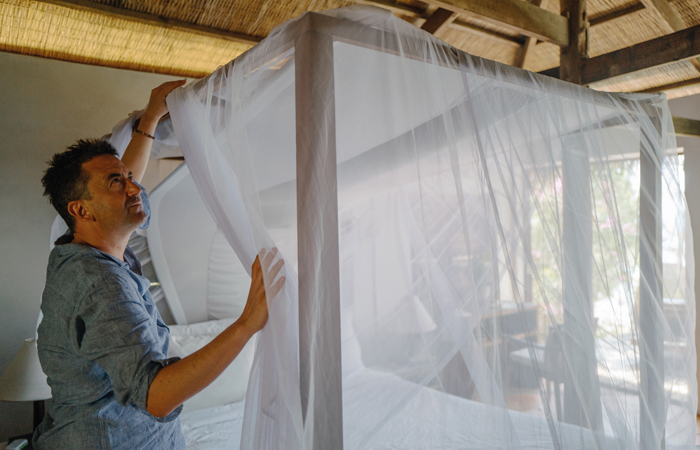In OTC
Follow this topic
Bookmark
Record learning outcomes
As things start to feel more summery, and while sunny days are a time for outdoor activities and relaxation, there are still precautions that people should remember when it comes to having fun in the sun. Take a look at some of the common conditions pharmacy teams may get questions about throughout the summer months.
Insect bites and stings
Once the sun comes out, so do a host of biting and stinging creatures, and pharmacy teams will start to see customers asking for help to tackle these itchy issues.
Even though the majority of insect bites are not serious and usually get better within a few days, Jacquie Lee, Numark medication safety officer and information pharmacist, says prevention is better than cure, as occasionally they can become infected.
“To help prevent insect bites, patients can use an insect repellent containing 50 per cent DEET,” says Jacquie. “In addition, they should be advised to cover any exposed skin and cover nearby food and drink to deter insects from the smell.”
If warding off the attackers has not worked, Jacquie says there are plenty of self care tips which people can take should they be bitten or stung. “Firstly, remove the sting and wash the area with water and soap,” she says. “Then apply a cold compress for 10 minutes and raise the affected area to reduce swelling and avoid the urge to itch. Patients can also take ibuprofen or paracetamol to reduce any pain, use antihistamines or calamine to reduce swelling and redness, and use antihistamines or hydrocortisone cream to relieve any itching.”
Tackling travel sickness
Travel sickness is a common condition – especially among children – that can make the thought of holiday journeys less than pleasant. Thankfully, there are lots of strategies that can help prevent motion sickness and make for a less queasy ride.
“Aim to eat light, carbohydrate-based foods such as cereals an hour or two before travelling”, says Jacquie, “and break up long journeys by getting some fresh air, drinking cold water or, if possible, taking a walk”.
“Sitting in the front seat of a car, over the wing of a plane or on the deck in the middle of the boat will limit motion and people with travel sickness should avoid reading or watching the screen,” she adds.
For customers wanting to try medication to help prevent travel sickness, Jacquie says pharmacy teams can recommend “antihistamines or hyoscine versions” but should advise that “they work better if taken before the journey, and patients should follow instructions on the packet, as some medicines don’t work straight away or last longer than others”.
Some medicines for motion sickness can cause drowsiness, so another option is to try acupressure bands that are worn on the wrist.
Avoiding DVT
Deep vein thrombosis (DVT) is a type of blood clot most commonly formed in the leg, causing swelling, pain and discomfort. It is a serious condition which, if left untreated, can lead to fatal blood clots in the lungs – called pulmonary embolism (PE) – with 30-50 per cent of people who develop DVT going on to have long-term symptoms and disability.
While long distance travel is a risk factor for DVT, it doesn’t just affect people who have been on a flight. Any type of long journey where a person is sitting down for prolonged periods can lead to slow blood circulation, which increases the risk of developing a blood clot within a deep vein in the body.
The risk of DVT also increases if a person has pre-existing risk factors including a history of DVT or PE, blood clotting abnormalities, cancer, a recent surgery or injury, is pregnant, has varicose veins, mobility problems, or is living with obesity.
Pharmacy teams can give long-distance travellers advice on preventative measures to avoid DVT, such as moving around as much as possible on their journey, avoiding alcohol and staying hydrated. Anti-embolism stockings (AES) or graduated compression stockings (GCS) can also be useful, and pharmacy teams should ensure they know how to advise customers on how to buy the correct type and size of stocking and wear them correctly.
NHS advice is that there is now considered to be “no place for aspirin in the prevention of travel related DVT or PE” but that “low molecular weight heparin can be considered for those at higher risk of developing DVT”. This treatment is administered by injection and must be prescribed by a GP or hospital specialist and used under their direction.
Pharmacy First
One of the seven common conditions covered by the Pharmacy First service is infected insect bites and stings in children aged one year and over, and adults.
In order to be eligible for the supply of flucloxacillin treatment via the service, the pharmacist will use the clinical pathway to diagnose infected insect bite or sting using the appropriate NICE CKS guidance. This requires clear evidence of infection that is present or worsening at least 48 hours after the initial bite or sting, with three or more of the following symptoms: redness of the skin, pain or tenderness to the area, swelling of the skin, skin surrounding the bite or sting feeling hot to touch. The pharmacist will also need to see redness or swelling of the skin surrounding the bite or sting that is spreading, and/or evidence of pustular discharge at the bite or sting site.
If people are ineligible for the service, they can be advised to try non-antibiotic treatment such as oral antihistamines to help relieve itching, and to return to the pharmacy for pharmacist reassessment if their symptoms worsen at any time or do not improve after three days.

Mosquito nets provide an extra layer of protection whilst sleeping to keep mosquitoes and other insects at bay.
Summer sporting events
This summer will see people travel from across the globe to attend some of the world’s most hotly contested sporting events. Football fans will be heading to Germany for the UEFA Men’s Euro 2024 tournament from 14 June to 14 July, and the Paris 2024 Olympic and Paralympic Games will be the biggest event ever organised in France, from 26 July to 11 August.
Community pharmacy teams can help sports fans make the most of their trips with handy health advice in advance. George Sandhu, deputy superintendent pharmacist at Well, offers the following strategies for pharmacy staff to give to customers:
- Prioritise taking everyday medical items or medication/equipment that you find yourself frequently using on a regular basis in your hand luggage for easy access. This could take the form of prescription medicine, and everyday items such as paracetamol, and antihistamines if you require them during the pollen peak of summer
- Know what’s allowed: Although many countries offer similar medications, some countries do not allow medicines from the UK, so customers should check with the pharmacist before travelling as they can recommend an alternative that aligns with that country’s laws. Always take a copy of your repeat prescription with you
- Protect your stomach: New foods and drinks may sometimes have a negative effect on your stomach which could lead to aches, pains and discomfort. To prepare for this, pack diarrhoea medicine and rehydration sachets
- Don’t forget the sunscreen: Spending time outdoors watching games means potential prolonged sun exposure. Advise customers to use a broad-spectrum sunscreen with at least SPF 30, reapplying every two hours or after sweating
- Staying hydrated is crucial, especially in the summer heat. Remind travellers to drink plenty of water throughout the day and avoid excessive alcohol consumption, which can lead to dehydration. Pharmacists can suggest rehydration solutions if necessary
- Travel first aid kit: Suggest that people create a basic first aid kit including band-aids, antiseptic wipes, tweezers, pain relief, and any other personal medical necessities.

As well as wearing an SPF throughout the day, advise customers to wear protective clothing, including hats.
“Customers should be applying at least 30ml of sunscreen all over the body for each application”
Travel vaccination services
Pharmacy teams can advise customers planning to travel outside the UK that while the NHS routine immunisation (vaccination) schedule protects them against a number of diseases, it does not cover all of the infectious diseases found overseas, so they should make sure they are fully vaccinated against some of the wider world’s more serious diseases – and, indeed, some countries require proof of this before they will allow entry.
Customers can find out which vaccinations are necessary or recommended for the areas they will be visiting by asking the pharmacist or checking Travel Health Pro and the NHS Fit for Travel websites. They can then check with their GP practice or on the NHS app to find out if their existing UK vaccinations are up to date.
The following travel vaccines are available free on the NHS:
- Polio (given as a combined diphtheria/tetanus/polio jab)
- Typhoid
- Hepatitis A
- Cholera.
Customers will have to pay for travel vaccinations against:
- Hepatitis B
- Japanese encephalitis
- Meningitis
- Rabies
- Tick-borne encephalitis
- Tuberculosis (TB)
- Yellow fever (only available from designated centres).
Ideally, travellers should book in with their community pharmacy’s travel clinic at least six to eight weeks before their trip, as some vaccines need to be given well in advance to allow the body to develop immunity, and some involve a number of doses spread over several weeks or months.
Further information: nhs.uk/vaccinations/travel-vaccinations/travel-vaccination-advice/.
“They should make sure they are fully vaccinated against some of the wider world’s more serious diseases”
STIs
Sexually transmitted infections (STIs) are a risk abroad, as they are at home, so customers should take their own condoms and practice safe sex. If they think they may have been exposed to an STI while away, they should get medical advice and STI screening as soon as they return home.
With so much to think about, it’s easy for travellers to forget some of the key travel health points, and although most tourist areas will have pharmacies and medical attention available if necessary, there’s one more important piece of advice pharmacy teams can give to customers getting ready to head off.
“Teams can remind patients travelling to an EU country or Switzerland that they can access medically necessary healthcare by having a free EHIC card, or its replacement, a Global Health Insurance Card and travel insurance adequate for their needs (which covers pre-existing medical conditions) is also strongly recommended, wherever the trip may be,” says Care’s expert pharmacist, Karen Baker.
Staying safe in the sun
Results of a new survey by the British Skin Foundation (BSF) reveal that 51 per cent of Brits have accidentally sunburned themselves, even though 81 per cent of people claim sun safety precautions are important to them and their family. Also worrying is recent data from online skincare retailer Face the Future, which showed that 45 per cent of people in the UK are not worried about skin cancer, and 46 per cent are not familiar with the symptoms.
Experts now agree that even without a burn, sun exposure raises skin cancer risk, which is why it is so important for pharmacy teams to remind people to protect their skin from the sun, as well as how to manage sunburn if it does occur.
“When it comes to sun safety, pharmacy teams should advise customers to always carry with them and apply sufficient sunscreen – ideally sunscreens containing UVA and UVB filters,” says Karen Baker, Care’s expert pharmacist.
“Customers should be applying at least 30ml of sunscreen all over the body for each application, and ensure they use a high factor.”
The Skin Cancer Foundation advises everyone to use a broad-spectrum sunscreen with an SPF of 15 or higher every day, and for extended outdoor activity, a water-resistant, broad-spectrum sunscreen with an SPF of 30 or higher, reapplied every two hours or after swimming or sweating.
“Sunscreen typically has a shelf life of six to 12 months”, adds Karen, “so it’s important for teams to communicate the importance of replacing sunscreen every year as the SPF efficacy can drastically reduce over time”.
If sunburn does happen, Karen says: “Pharmacy staff can recommend cooling the skin with cool water and following up with applying after sun to moisturise the skin. For customers seeking sun burn relief, calamine creams are effective product recommendations pharmacy teams can reach for. These lotions provide moisture to the affected area, whilst not drying out the skin. Creams containing calamine will also relieve the itching and peeling associated with sunburn, and if kept in the fridge, [it can] also provide relief by cooling the skin.”

